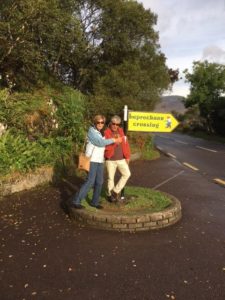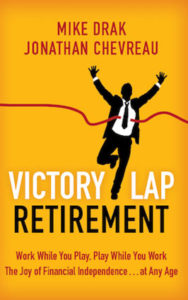
As I write an early draft of this blog, I am in Dublin, Ireland, at the midpoint of the second week of a two-week holiday. Readers may recognize this blog’s headline as the subtitle of the new book I’ve recently published, Victory Lap Retirement. It was written with ex-banker Mike Drak, whose blogs have been regularly posted or republished here at the Hub.
I believe it was our editor, Karen Milner, who came up with this inspiring subtitle but whoever first articulated it, we all agreed on it once it came up. I often think of it when I’m working and really playing, or vice versa.

For example, right now I’m working on writing this blog while officially “Playing” at being on holiday. The ostensible reason for the trip was to tack on a week’s vacation to a business trip my wife took to attend the FIATA 2016 World Congress in Dublin. That’s Ruth on the extreme right of the photo, along with colleagues and a spouse at a reception at Dublin’s Trinity College.
Such “Work” came at the end of a solid week of being a tourist elsewhere in Ireland, with the couple with whom we’ve been travelling.
I suggested to them in jest that the job of being a “tourist” would be a tough one if it meant 49 weeks a year, eight hours a day of “touristing,” however much it might seem to be a dream job. Come the end of any week of touring historical sites, art galleries and such – much of it on one’s feet, either walking or standing – you’d greet the arrival of the weekend and the cessation of tourism for a few days with some relief! (If you happen to be a Facebook friend, you can see about 40 photos of the trip under Ireland, here.)
It’s all relative really: if you were a writer for a Tourist guide book like Lonely Planet, you’d no doubt regard tourism as “work.”
Playing while you Work
So that’s an example of working while you play. What of the opposite: Play while you Work? Well, this is quite common as well, as anyone who has used an office computer to sneak a peek at Facebook can well relate to. In fact, Victory Lap Retirement describes the four-hour day that I used to write about when I was fulltime at the Financial Post. While many employers may believe they are getting seven or eight hours a day of productivity from their workers, you could argue that a few hours of that is preliminary or post-work activity that’s not really the core activities for which they’re being paid.
Another example is a Mike Drag blog I illustrated with the classic photo of a couple of business people playing golf. Certainly in the sales profession, a lot of “work” gets done under the guise of “playing” golf or other activities conducive to networking or schmoozing. If you are a corporate supporter of sports or the arts and provide tickets to marketing personnel who invite clients and prospects, is that working or playing, or a bit of both?
Blurring lines of leisure and work

So our subtitle illustrates the increased blurring of lines between work and play that is so typical of the culture we live in. This is especially felt by those, like myself, who work from home.
Those who still commute from a distinct home to a corporate office feel the division between work and home more acutely but any home-based freelancer knows well how the work/home or work/play lines can easily dissolve.
Busy executives who check email or social media on their smartphones when they’re commuting home or in the evenings at home after supper: are they “working” while they play? Their long-suffering spouses might say so.
So it’s an inspiring subtitle we chose, whoever came up with it. (It wasn’t me, I know that). And of course, the post-corporate world of semi-retirement and encore careers that we describe in the book takes the concept to another level still. The commuting salaried employee is still entrenched in the work/play dichotomy but the self-employed semi-retiree occupies a netherworld of work and play where it’s often hard to tell which is which.

In the end, if you are living a life of purpose and meaning, and you enjoy what you are doing, then it hardly matters if it qualifies as formal work or play.
Semi-retirement further blurs the lines
I suppose you can say that if an activity generates income or the possibility of it sometime in the future, then that’s a form of work. Conversely, activity performed strictly for the joy of it, with no prospect of financial compensation now or in the future, might be considered play. As Mike writes frequently, it’s about being a kid again when play is truly play.
But consider the most successful creative artists, whether musicians, painters, writers or others: true artists will practice their crafts well into old age, whether or not they derive income from it. They truly have merged work and play.
I recall John Lennon being quoted early in the days of the Beatles about why he started the group. He’d seen Elvis Presley on the big screen and thought it looked like a nice way of earning a living. “To avoid having a real job and to pull birds,” was the gist of his rationale. The “play” of being a full-time musician certainly involved a form of work (hence the touring that they had to abandon at the height of their fame) but of course this “play” generated far more money in the end than the mundane formal “work” that their creative success made possible. Similarly Mick Jagger of the Rolling Stones, who attended the London School of Economics but has certainly earned much more money playing the rock star than if he had “worked” as an economist or a banker.
Ironic, isn’t it? So think about our subtitle in this context.
 Jonathan Chevreau is founder of the Financial Independence Hub and can be reached at jonathan@findependencehub.com.
Jonathan Chevreau is founder of the Financial Independence Hub and can be reached at jonathan@findependencehub.com.
Victory Lap Retirement, coauthored with Mike Drak, is now available for orders online.
It’s also available as a Kindle e-book and on Kobo. The paperback edition will be officially available in bookstores early next week.


